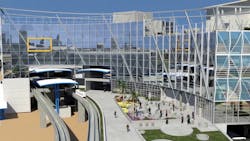JTA Board of Directors Approves JRTC Construction Project
The Jacksonville Transportation Authority’s (JTA) Board of Directors has approved the project budget and supplemental funding appropriation for the Jacksonville Regional Transportation Center (JRTC), which will be a gateway to the Jacksonville region.
Located in the historic LaVilla community, the JRTC will represent the intersection of the city’s past, present and future, by bridging the rich histories of the people who helped lay the foundation for Jacksonville’s transportation network.
“Many of the early laborers who lived in LaVilla worked as porters, stevedores, engineers, brick masons and construction workers,” said JTA Board Chairman Isaiah Rumlin. “Their skills helped build and support the roads, rail and waterways that turned Jacksonville into a major transportation hub.”
“In many respects, by locating the JRTC here, we are honoring the cultural epicenter created by the families and early residents of LaVilla.,” said JTA CEO Nathaniel P. Ford Sr. “It is our hope that the JRTC will not just be a facility to go from one place to the next, but a destination in and of itself that is an economic catalyst for the region.”
The JRTC construction project will be built in two phases. Phase I is the Intercity Bus Terminal (IBT) that is currently under construction with a January 2018 completion date. Phase II is the construction of the bus transfer facility and administration building. The estimated completion date for Phase II is November 2019.
“The JRTC construction project will connect key local, regional and intercity service in one location and continue the growth and redevelopment of the LaVilla area,” said DIA CEO Aundra Wallace. “This strategic project of regional significance will also create jobs and put people to work.”
The JRTC project has been in the works for well over a decade. After the selection of Pond/Michael Baker as the architect in April 2016, the JTA met with numerous stakeholders to ensure the JRTC is designed to meet the transportation needs of generations to come. As a result of stakeholders’ input, the 30 percent design presented to the Board on April 25, 2017 provided a refined cost proposal.
Funding has been identified which covers the proposed maximum total project cost of $57.3 million for Phases I and II of the JRTC. Funding for the project will be provided from a combination of federal, state and local funding sources.
